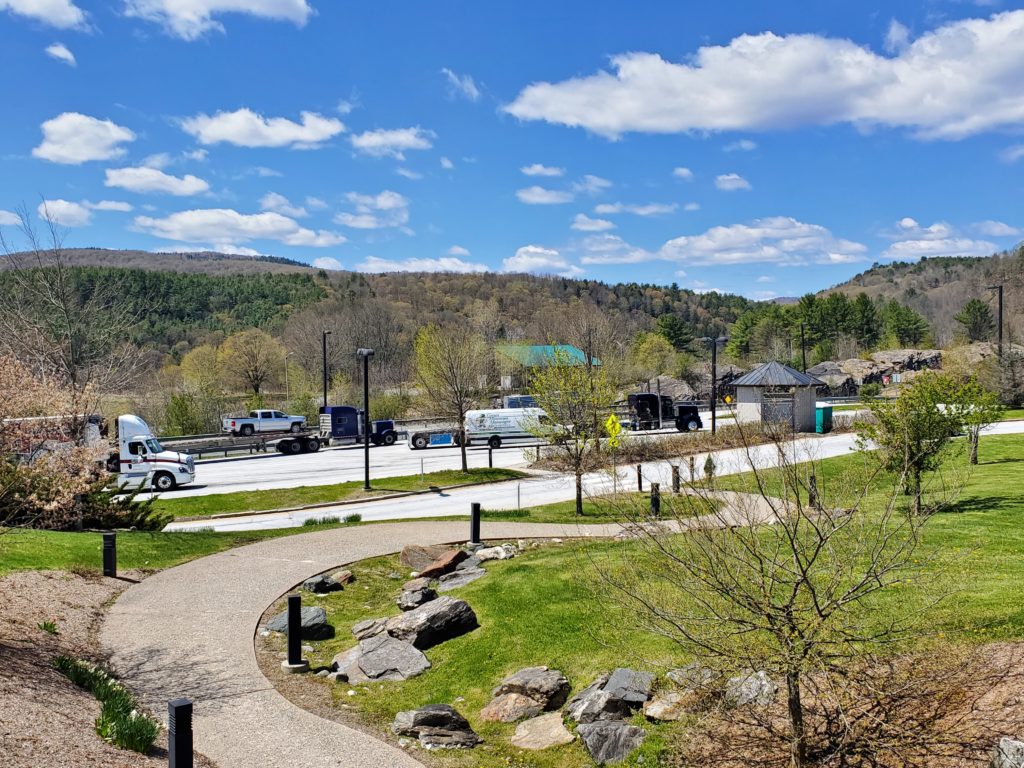The following list of Vermont rest area rules were researched from the State’s “Vermont Statutes Annotated”, “Vermont Administrative Code”, publications issued by the Vermont Department of Transportation, and signs posted at various rest areas in Vermont.

Vermont Rest Area Rules
The State of Vermont has adopted some laws with respect to “Limited Access Facilities” which are effectively highways where adjacent land owners don’t have a drive-way (or easement) on to. These are primarily Interstate Highways, but can also be State Highways. The State considers rest areas to fall into definition of Limited Access Facilities. These laws are summarized below…
- Overnight camping is prohibited at rest areas, picnic grounds, parking area, or park-and-ride facility.
- To read the full, word-for-word text of these laws see, “§ 1106. Limitations on use of State highway facilities“.
In addition, the Vermont Department of Transportation (VTrans) has adopted some administrative codes with respect to public use of rest areas…
- Overnight camping is prohibited at rest areas, except for those rest areas that have been designated for overnight camping.
- Selling goods, wares, merchandise, or services is prohibited at rest areas.
- Hitchhiking and loitering is prohibited at rest areas.
- Panhandling is prohibited at rest areas.
- Use, display, or discharge of firearms and fireworks is prohibited at rest areas.
- Hunting, trapping, and fishing is prohibited at rest areas.
- Parades and demonstrations are prohibited at rest areas.
- Picnics and other forms of outdoor recreation are prohibited at rest areas, except for those that were designed for such purpose.
- Displaying or posting of advertising information is prohibited at rest areas.
- Cutting or picking flowers, branches, shrubs is prohibited at rest areas.
- Littering on highways and rest areas is prohibited.
- To read the full, word-for-word text of these laws see, “14 053 004. Regulations Governing the Use of State Highways with Limited Access Facilities“.
How Long Can You Stay at a Vermont Rest Area?
There is no maximum time limit. The State has not adopted a statewide law or regulation limiting the amount of time you can spend at a rest area. Generally, you’re allowed to stay there for as long as it takes to rest up enough to resume driving safely. If you were to stay over 24 hours, you may attract attention from law enforcement officers who may try to find some other reason to cite you.
Is Overnight Parking Allowed at Vermont Rest Areas?
Yes, overnight parking is allowed. Because these rest areas are open 24 hours a day, 7 days a week, you are allowed to arrive at night and stay a reasonable length of time to get fully rested. That may effectively last all through the night.
But keep in mind that the State also has both a law and an administrative regulation against “overnight camping”. However, if you can demonstrate that you remain in your vehicle, and are trying to get some badly needed sleep, it’s highly unlikely a law enforcement officer will order you out. No one is going to force a drowsy driver back on to the road. Refer to the question of camping below for more discussion.
Can You Sleep In Your Car at a Rest Area?
Yes, you can sleep in your car. The State of Vermont has no laws or regulations prohibiting sleeping in a vehicle while at a rest area. The State would expect drowsy drivers to use a rest area to get some sleep. They would prefer you sleep in your vehicle rather than sleep on the ground or on a picnic table.
Is Camping Allowed at a Rest Area in Vermont?
No, camping is not allowed. Camping is different than “overnight parking” in that camping is a form of recreation. Overnight parking is simply a means to get rested enough to resume driving safely. If law enforcement officers witness you outside at a rest area, during night time hours, enjoying various forms of recreation, they will cite you for overnight camping. Moreover, if they can see light coming out of your RV and hear the sound of a television playing, they may also cite you for overnight camping. But if you remain in your vehicle, put up shades to block out all light, and act like someone who is too sleepy to do much of anything, it’s unlikely they’ll bother you.
Where Can I Get a List of Vermont Rest Areas?
The Vermont Department of Transportation has published a map of their rest areas and exits


It would be nice if Vermont did have open rest areas 24/7; but they do not. Have never found an unlocked one after dark, and some do not allow overnight parking at all. (Waterford on I-93 at VT-NH border.
This is incorrect information! Sadly!
The law specifically outlines that there is no overnight camping at rest areas off highways and other areas.
VT state law:
A person shall not use any part of a public highway right-of-way, a public rest area associated with a public highway, or any public land not so designated by the
agency, department, or municipality having control of same as an overnight camping area for the purpose of overnight camping. A person who violates this section
shall be fined not more than $50.00 for each day he or she is in violation. (Added 1985, No. 269 (Adj. Sess.), § 1.)
Reference: https://legislature.vermont.gov/statutes/section/19/011/01106#:~:text=A%20person%20shall%20not%20use,the%20purpose%20of%20overnight%20camping.
…legal definition of overnight camping: Overnight camping means occupation of a vehicle parked in a designated car park or other designated area by one or more persons at any time between the hours of 11pm and 6am, in circumstances from which it is reasonable to infer that such person or persons had been occupying the vehicle other than for the purpose of parking and leaving a vehicle therein or for purposes reasonably incidental or ancillary thereto.